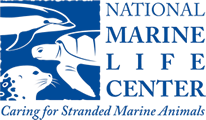2013 Red Bellied Cooter Turn-In Measures Progress in MA
 On Thursday, May 30th, endangered red bellied cooters from across the state gathered at the National Marine Life Center for their annual “turn-in”: a culmination of the Head-Start program. The Head-Start program works with local conservation organizations, such as NMLC, who welcome hatchlings in the fall and provide warm water and food for 8 months to promote growth among the turtles. Kept in 82 – 86 degree tank, they are provided with as much romaine and red leaf lettuce as they will eat. When they are released back to their natural habitats in early summer, chance of survival is increased due to weight and development gained in captivity. Survival can increase from 1% to over 70%!
On Thursday, May 30th, endangered red bellied cooters from across the state gathered at the National Marine Life Center for their annual “turn-in”: a culmination of the Head-Start program. The Head-Start program works with local conservation organizations, such as NMLC, who welcome hatchlings in the fall and provide warm water and food for 8 months to promote growth among the turtles. Kept in 82 – 86 degree tank, they are provided with as much romaine and red leaf lettuce as they will eat. When they are released back to their natural habitats in early summer, chance of survival is increased due to weight and development gained in captivity. Survival can increase from 1% to over 70%!
The “turn in” was an amazing representation of how involvement in this program can make a huge difference in the development of an endangered species. I’ve never seen so many turtles in my life, specifically ones with such drastic growth, starting out the size of a quarter and developing into twice the size of a human hand.
Turtles began arriving promptly at 9:00am, as people involved in the program proudly handed over the cooters they had nurtured and help grow over the past 12 months. The care and dedication provided by such individuals was blatantly displayed, as watchful eyes looked over their turtles before being weighed, measured and pit tagged (a technique in which a micro-chip, similar to that in a cat or dog, is placed in the turtle’s skin to ensure tracking).

The drop off was followed by a tour of the NMLC facilities, showing those involved with the Head Start program the facilities and techniques used to rehabilitate animals who pass through the NMLC animal hospital.Following the tours, Dr. Tom French, Assistant Director of the Natural Heritage & Endangered Species within the Massachusetts Division of Fisheries and Wildlife, presented information about the Head Start program and its success over the past few years.
After he gave thanks and presented a slideshow, the hands-on work began! Students from all over assisted Massachusetts wildlife biologists in measuring, weighing and pit-tagging. There were over 150 turtles, but with teamwork, all received the necessary attention and measurements.
On Friday, May 31st, the cooters were privately released throughout freshwater locations in Southern Massachusetts. However, NMLC has inherited eight new cooters who were unable to join the release on Friday due to diseases: three with fungus and five with metabolic bone disease, giving NMLC and opportunity to not only help these animals, but gather further research on the causes of such ailments. The interns, myself included, took the opportunity to name our new friends. John, Paul, Ringo, George, Yoko, Mr. Kite, Sgt. Pepper and Jude join in the NMLC family with high hopes for recovery!
Thanks go out to everyone involved in the Head Start program.Your work has impacted not only the red-bellied cooter population, but freshwater ecosystems as a whole. NMLC is lucky to be able to host such a special culmination and celebration of growth and success.
Another successful year, and more to come!

